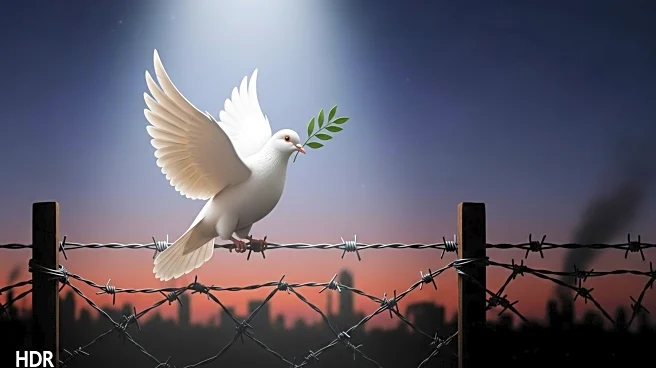What's Happening?
Tunisian filmmaker Kaouther Ben Hania premiered her film 'The Voice of Hind Rajab' at the Venice Film Festival, focusing on the tragic story of a 6-year-old girl killed in Gaza. The film is set entirely within the dispatch center of the Palestine Red Crescent Society rescue service and uses real audio from Hind Rajab's call for help. The film portrays the harrowing events of the Israel-Hamas conflict, with actors depicting first responders. Ben Hania was inspired to create the film after hearing the audio recordings of Hind's call, which were widely shared on social media. The film aims to capture the urgency and emotional impact of the situation without showing graphic images, focusing instead on the voice of the young girl.
Why It's Important?
The film 'The Voice of Hind Rajab' sheds light on the ongoing conflict in Gaza, which has resulted in significant loss of life and humanitarian challenges. By using real audio and focusing on the emotional impact of the story, the film brings attention to the human cost of the conflict. It serves as a powerful reminder of the innocent lives affected by war and the urgent need for international awareness and intervention. The film's premiere at a major festival like Venice highlights its potential to influence public opinion and policy discussions regarding the Israel-Hamas conflict.
What's Next?
The film is expected to be a significant contender in the awards season, with Tunisia selecting it as its candidate for best international feature at the Oscars. The involvement of high-profile executive producers like Brad Pitt, Joaquin Phoenix, and Rooney Mara further elevates its profile. While the film does not yet have theatrical distribution in North America, Ben Hania hopes it will reach a global audience, potentially sparking further dialogue and action regarding the Gaza conflict.
Beyond the Headlines
The making of 'The Voice of Hind Rajab' was an emotional experience for the cast and crew, who were deeply affected by the real-life events they were portraying. The film also highlights the ethical considerations of storytelling in conflict zones, emphasizing the importance of preserving the dignity and voice of those affected. By choosing to focus on the dispatch center rather than graphic imagery, Ben Hania challenges the audience to engage with the story on a deeper emotional level.










